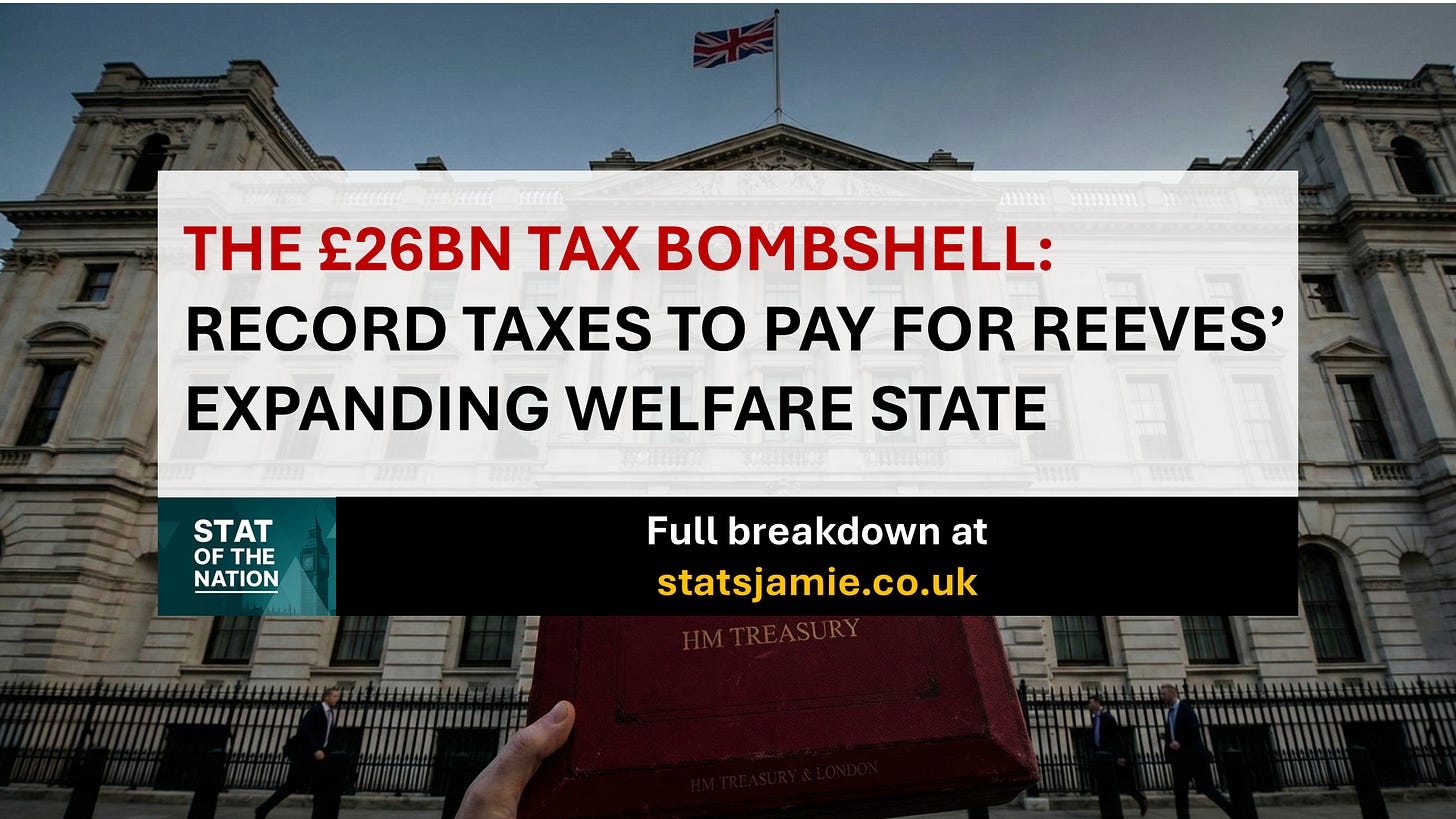The £26bn Tax Bombshell: Record Taxes to Pay for Reeves’ Expanding Welfare State
Five months of job losses, a £92bn borrowing overshoot, and rising welfare commitments leave workers footing the bill.
Minutes before Rachel Reeves rose to speak, the Office for Budget Responsibility accidentally posted the full forecast online — revealing £26 billion in tax rises by 2029/30, and a tax burden heading to 38% of GDP, the highest in modern British history.
Now that the numbers are already out, the real question isn’t what Reeves is announcing — it’s why the Government is being forced into the highest taxes in modern times.
📉 Why Taxes Have to Rise — The Economic Reality Behind the Budget
For over a year, the UK economy has been weakening:
178,000 fewer payroll jobs since Labour took office
Productivity flatlining
Rising welfare pressures
A £92bn fiscal gap created by higher borrowing and weaker growth than forecast
Put simply: The government is raising taxes because it has a revenue problem, not a growth story.
Weak labour markets mean weak tax receipts. Weak productivity means weak wage growth. Higher inactivity means higher welfare spending.
When you put all that together, the Treasury needs money — urgently.
📈 What the Budget Reveals: Britain Heading to a 38% Tax Burden
According to the OBR:
Tax burden rising to 38% of GDP
Higher than forecast in March
Highest level in modern UK history
Driven overwhelmingly by policy choices, not by rising prosperity
This is a structural shift into a permanently higher-tax Britain.
📈 All the Tax Rises — The Full £26bn Package (By 2029/30)
Rather than a single headline announcement, the Budget raises taxes through a long list of measures that, together, total £26bn a year by 2029/30.
The big drivers:
Freezing income tax & NI thresholds until 2030/31
Pushes millions into higher tax bands
Raises the most revenue of any measure
Freezing the employer NI threshold at £5,000
Raises the cost of hiring in an already-weak labour market
Applying NICs to pension salary-sacrifice contributions
A direct tax on long-term savings for workers and employers
And the smaller-but-significant cluster:
Higher tax rates on dividends, savings income and rental income
Mileage-based EV road charging from 2028
Reduced corporation tax allowances
Gambling tax changes
CGT tweaks and a surcharge on £2m+ homes
HMRC compliance and enforcement increases
Individually minor. Collectively transformative.
💥 What Freezing Thresholds Mean for Workers
This is the most important — and least understood — tax change in the entire Budget.
Normally, tax thresholds rise with inflation. When they don’t, but wages do:
You move into a higher tax band
Your tax bill rises even if your living standards don’t
More of every pay rise is taken away by HMRC
This “fiscal drag” is the biggest stealth tax in Britain today. It requires no headline, no legislation — just inaction.
By keeping thresholds frozen for years, the Government is quietly shifting millions into paying higher taxes and pushing the tax burden to a modern-era record.
💼 Taxes on Work Are Rising — So Where Is the Money Going?
If workers and employers are paying more, what is their money funding?
It isn’t new services.
It isn’t investment.
It isn’t growth.
It is going to:
Reverse earlier welfare cuts
Expand new welfare entitlements
Sustain a rising welfare system at a time when fewer people are in work
Put simply:
Taxes on work are rising to pay for higher welfare spending, while the economy weakens and the labour market shrinks.
🏁 The Bottom Line
Strip out the slogans and the spin, and today’s Budget reveals a blunt reality:
Taxes are rising because Britain is weakening — and because the Government has chosen to expand welfare at the very moment the economy can’t pay for it.
Fewer jobs.
Lower productivity.
Higher welfare commitments.
Borrowing £92bn above expectations.
This Budget isn’t a growth plan. It’s a plan to keep the system afloat — with the highest tax burden in modern British history.
A £26bn-a-year tax programme delivered into the most fragile economic backdrop in a decade.
✍️ Jamie Jenkins
Stats Jamie | Stats, Facts & Opinions
📢 Call to Action
If this helped cut through the noise, share it and subscribe free — get the stats before the spin, straight to your inbox (no algorithms).
📚 If you found this useful, you might also want to read:
📲 Follow me here for more daily updates:




